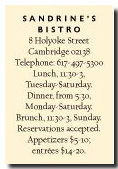Main Menu · Search · Current Issue · Contact · Archives · Centennial · Letters to the Editor · FAQs

| An Academy for the Third Age | Sandrine's Bistro | |
| Tastes of the Town | The Harvard Scene | |
| The Sports Scene | ||
 | |
| |
Take, for example, a dish like choucroute Alsacienne, which sounds French enough. Yet its ingredients might include weisswurst, bauernwurst, smoked pork loin, and hickory-smoked bacon along with juniper berries, onions, duck fat, and the eponymous sauerkraut. The cuisine of Alsace reflects the region's history of German invasions; there, one eats coq au Riesling. In general, Alsatian kitchens produce heartier, more country-style fare than their counterparts to the south and west. And a few thousand miles farther west, choucroute Alsacienne is a specialty at Sandrine's Bistro, a new restaurant in the heart of Harvard Square that offers Alsatian French food at prices that don't require a call to your broker.
Chef-owner Raymond Ost, who named Sandrine's after his 15-year-old daughter, claims that Alsace and Lyon are the two leading gastronomic regions of France. As a native of Strasbourg, he may be biased, but Ost can bolster his view by noting that Alsace now boasts more three-star restaurants than any other region. For the last nine years, Ost was chef at  Boston's Hotel Meridien, whose Julien Restaurant tests not only sybaritic aptitudes but also credit-card limits. There he worked the high end of the food chain; at Sandrine's, Ost's goal is more modest, as the word bistro implies. "French food," he states simply, "doesn't need to be expensive."
Boston's Hotel Meridien, whose Julien Restaurant tests not only sybaritic aptitudes but also credit-card limits. There he worked the high end of the food chain; at Sandrine's, Ost's goal is more modest, as the word bistro implies. "French food," he states simply, "doesn't need to be expensive."
Accordingly, Sandrine's atmosphere is warm and welcoming. Since Chez Jean closed a year ago, there has not been a French restaurant in Cambridge that genuinely felt like France. Sandrine's does. Its windows facing the street have café-style curtains, and the décor, in rich cream with coppery-red and steel-blue accents, creates a comfortable, cozy interior, especially on a winter night when a fire blazes in the oven behind the bar. The only visual clinker is the tiresome American fad of dressing waitresses in drag--men's button-down shirts and ties. But never mind: Sandrine's has that increasingly rare item, a prix-fixe menu, which, on the night we dined there, offered onion soup, rainbow trout soufflé, and dessert for $26.
Depend on it: when the frisée is fresh, good things will follow. A very fresh baby frisée and endive salad accompanied one of the appetizers, a bûche of warmed goat cheese marinated in fresh thyme and olive oil. Warm chèvre is one of those magical substances which, spread on toast rounds cut from a ficelle or baguette, unfailingly puts one in a cheerful mood--especially when accompanied by a fine glass of Côtes-du-Rhône, as it was on this occasion. My companion, a certified voluptuary and carnivore, ordered the fruitwood-smoked salmon served with horseradish cream sauce. The fish was nicely textured, and the sauce proved bright and loaded with flavor, its sting a lovely counterpoint to the salmon's subtler music. This arrived with a potato galette, which is to Central European potato latkes what Parisian crêpes are to flapjacks. A third appetizer brought together a lovely chorus of flavors: braised artichoke and shaved fennel with grilled Portobello mushrooms. The mushrooms were paper-thin and we wished only--as we rummaged like Euell Gibbons through the wild greens--that there were a few more of them.
 The warm goat cheese bûche with toast and a frisée and endive salad. |
One of the specialties of the house is flammekueche, an everyday dish in Alsace: a large piece of flatbread (reminiscent of pita) that is spread with fromage blanc, onions, and various toppings (mushrooms, hickory-smoked bacon, or smoked chicken). Luckily, the toppings have flavor because the bread and cheese have almost none; fromage blanc, a sort of hybrid of sour cream and cream cheese, might be renamed fromage bland. For my money, this Alsatian specialty can remain in Alsace.
In contrast, the baked rainbow-trout soufflé arrived in a beautiful heart-shaped presentation, accompanied by a delicate lemon-accented sauce rich with earthy mushroom flavors. "It grabs you," opined the voluptuary. The vegetarian entrée, fettucini in a buttery sauce with julienned vegetables, was tasty, but ho-hum veggies (carrots, zucchini) muted its impact.
However, a superlative Washington State Cabernet Sauvignon (Paul Thomas, 1994), described as "round-textured, easy-going, black cherry fruit," provided enticing distraction. Another potable pleasure is one of the world's great beers: Fischer LaBelle, brewed in Strasbourg. Bottled in beer's equivalent of a magnum, this fine lager joins the brewing expertise of Germany to the refined palate of France.
The desserts, especially a warm apple tarte tatin with vanilla crème anglaise, continued the magic. Then out into the winter air, and an urban landscape that placed us squarely back in the United States. Expect to dine well at Sandrine's for $40 to $60 per person, everything included. The excellent wine list might tempt you higher, but you can also go economy class for slightly less. In either case, it's a lot cheaper than a flight to Alsace, and on your way home, you might just imagine that you'd been there.
~ C.A.L.
Main Menu ·
Search · Current Issue · Contact · Archives · Centennial · Letters to the Editor · FAQs
![]()